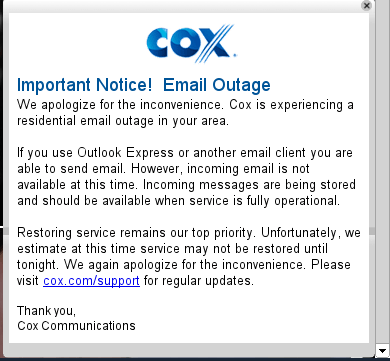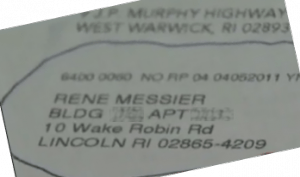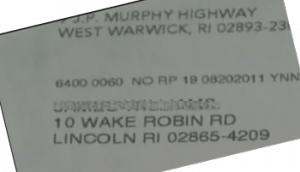
Cox injected this pop up message when customers launched their web browsers over the weekend, notifying them about the e-mail outage. (Courtesy: Broadband Reports forum reader ‘bb44’)
Our friends at Broadband Reports have been tracking Cox’s near-nationwide e-mail outage that left millions of customers without access to their company-supplied accounts over the weekend.
Customers in Rhode Island, Nebraska, Virginia, Arkansas, Florida, Kansas, Louisiana, and beyond began noticing the problem on Friday. Only Cox’s customers in the western and mountain states seemed unaffected.
Cox blamed the problem on a “failing server.” In an effort to reduce calls from complaining customers, Cox used a browser injection notification message alerting subscribers whenever they opened their web browsers. Sending e-mail to all affected subscribers was obviously not an option.
Cox customers, including many small businesses that still rely on their Cox-supplied e-mail addresses were very unhappy about the length of the outage.
By Sunday afternoon customers like Bill Roland of Ocala, Fla. were fed up.
“Heads should roll over this one and we should all get a credit on our bills,” Roland wrote on Broadband Reports’ Cox Forum. “I don’t really care when it’s out for 15 minutes in the middle of the night due to a maintenance window, but going on 48 hours with no end is sight is not acceptable.”
Roland would have to wait until early Monday morning for the queued mail held since the outage to begin slowly arriving in his mailbox.
Cox shared this statement about the outage:
As of 6:30 am ET, access to Cox email has been restored to all customers previously affected by the email outage. All customers should now be able to send and receive email messages.
If you lost access to your email during this outage, we have queued your emails received since Friday. You may continue to receive these queued emails over the course of the next several days. These will arrive gradually and may not be delivered in chronological order.
Now that service is restored we are moving forward with replacing email storage platform equipment and implementing measures to prevent a reoccurrence of these issues. We will remain intensely focused on this effort until all queued email messages are successfully delivered. Technical teams continue to be on high alert and monitoring systems closely.
We deeply regret the impact this outage has had on our customers and truly appreciate their patience as all Cox resources continue to be focused on this restoration effort.
Cox customers can call the company and request a courtesy credit for the outage, which the company is providing to those particularly upset by the e-mail loss.
Among those hardest hit: small businesses like those in Providence, RI which are particularly dependent on answering e-mail from customers during the holiday season. Several made their apologies to customers on their websites.
The best solution to this dilemma is to avoid using ISP-supplied e-mail accounts. Cox customers using Gmail or other web-based e-mail providers never realized there was an outage.
“The best reason not to use your ISP e-mail account is that it ties you down with your broadband provider,” writes Cox customers and Stop the Cap! reader Sam Hernandez. “I bought my own domain name for around $7 and I use Gmail to handle everything and have been able to switch providers or move to another city and never have to change my e-mail address. Gmail has proved to be very reliable as well.”
[flv width=”640″ height=”363″]http://www.phillipdampier.com/video/WJAR Providence Cox reports email outages now fixed 12-16-12.flv[/flv]
WJAR in Providence reports Cox’s near-nationwide weekend e-mail outage caused problems for area small businesses during the critically-important holiday season. (1 minute)
 Verizon is continuing efforts to gradually retire its copper-wire facilities in parts of six states, replacing existing copper wiring with a fiber to the home network.
Verizon is continuing efforts to gradually retire its copper-wire facilities in parts of six states, replacing existing copper wiring with a fiber to the home network.

 Subscribe
Subscribe Verizon Communications will decommission its existing copper wire facilities in multiple markets in Delaware, Maryland, Massachusetts, New Jersey, New York, Pennsylvania, Rhode Island, and Virginia starting in 2018.
Verizon Communications will decommission its existing copper wire facilities in multiple markets in Delaware, Maryland, Massachusetts, New Jersey, New York, Pennsylvania, Rhode Island, and Virginia starting in 2018.




